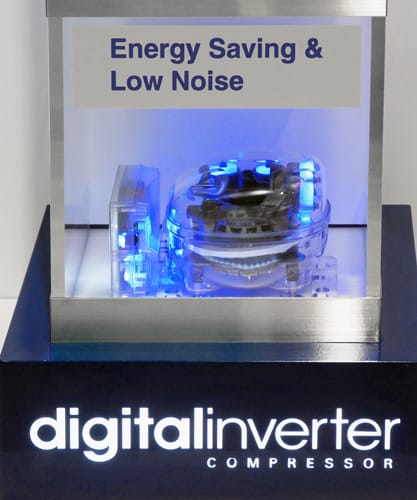Digital Inverter Compressors: Can't We All Just Chill Out?
New refrigerator technology will cut down on energy costs.
Recommendations are independently chosen by Reviewed's editors. Purchases made through the links below may earn us and our publishing partners a commission.
Finally, an innovation at IFA that Americans are almost guaranteed to get! Two of the world's leading appliance innovators, Haier and Samsung, are offering something that's definitely worth talking about in the world of refrigerators: digital inverter compressors. This new piece of technology is available on the second generation of Haier's 3D product line, which was released in Europe this past July, and (according to company representatives) every Samsung product in the United States within the next two years at the most. Many of you may have absolutely no idea what this means, or the impact it will have on your kitchen. It took a little bit for us to wrap our heads around it, as well, so let's take a moment to explain things.

Traditional fridge compressors are either on or off; there's no in-between. They pump cold air into your fridge, and once the interior is cold enough, they shut off. As the air warms up, they have to turn on again to start pumping more cold air to make up for the increase in temperature. Ever hear your fridge or freezer turn on during the day or in the middle of the night? That's what is happening. This method isn't exactly that efficient, since the warming and cooling of the air can cause pretty substantial degree fluctuation that can adversely effect the quality of your food. It's also bad for your electric bill, since the compressor has to launch itself into overdrive every time it turns on to prevent even more drastic temperature shifts than what is already occurring. Add to that the noise that compressors make—appliances turning on in the middle of a horror film is a traditional "jump" scare tactic familiar to every movie goer—and you have a piece of technology that needs some drastic improvements.
The digital inverter compressor abandons the "on/off" approach in favor of an "always on" style of temperature management. That may sound like an inevitably large drain on your electricity, but it's actually not. The compressor in Samsung and Haier fridges is constantly monitoring internal temperature, gradually slowing or speeding up as needed in order to maintain equilibrium. This means that, overall, the compressor doesn't have to work as hard since temperatures aren't falling out of whack as often. Representatives from both companies boasted significant energy savings, and we look forward to getting some appliances with this technology into our labs to determine just how much.
Regardless of how much money you may or may not save in your electric bill or how quiet your fridge may be, this is definitely going to have an impact on overall food preservation. Americans waste hundreds of dollars every year on spoiled products, and not just produce: dairy items, meat and fish are subject to short shelf lives if not cared for properly. While shopping habits can curb a big portion of this issue, improvements in fridge technology—such as digital compressors—can have a sizable impact, as well. A constantly maintained temperature is better for food storage: fridge fluctuations cause food to spoil faster, while unstable freezers can lead to some pretty nasty freezer burn. While energy efficiency may save you some money in your utility costs, improved food preservation is definitely going to result in pretty hefty reductions in your food bill...just don't keep more food even longer simply because you can, it would defeat the whole point.
Haier representatives claim their compressor will reduce temperature fluctuation down to no more than two degrees, while the Samsung display promised a variance of just one degree. These are both very impressive claims, and the value of this innovation (if it works) will be huge. When you consider the warranty policies that these companies are offering, you get an idea of just how important they think this is: Haier is touting a 12 year guarantee in the U.K., with an 11 year guarantee in the rest of Europe; Samsung provides a 10 year warranty on its new compressors.
In a very generous move, Samsung representatives stated flat out that they plan to sell this technology to their competitors for the betterment of the consumer. We have no idea as to the when, how, or who (let alone the "how much"), so that remains to be seen. It's certainly something to look forward to, though, as improvements in technology across the board can only mean improvements for everyone down the line.

